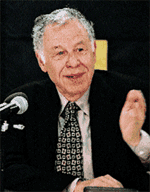Viewpoints: Terrorists in Balance
By Amitai Etzioni, University Professor
We are properly concerned about racial profiling of Muslim Americans, that our rights to privacy and assembly might be curtailed, and that we shall make short shrift of the rights of others as is so often the case when a society goes on a war footing. At the same time, we should not automatically reject all new measures to enhance our safety. The Constitution has always been a living document that was reinterpreted in line with the needs of the times. Without such reinterpretations African Americans would not be counted as full persons, the First Amendment would hardly be viewed as a strong safeguard of free speech, and surely there would be no constitutional protection of privacy, a term not mentioned even once in the Constitution and a right fashioned only some 35 years ago.

 |
|
Amitai Etzioni is a University Professor at George Washington University and is the author of The Limits of Privacy (Basic Books, 1999). |
The implied notion of a carefully crafted balance between rights and public safety is not as appealing as one-sided railing about potential threats to our rights—or calling for the suspension of the Constitution until we hang the bastards. But it is such a balance that reasoned people aspire to find. Indeed, the Fourth Amendment explicitly states that there be no unreasonable search and seizure, thus recognizing on the face of it that there are reasonable ones. There are searches that are in the public interest, as the courts have long and often ruled.
Where is the point of balance? As I see it, when there is a compelling public need (e.g., preventing attacks of the kind we experienced Sept. 11), and if there are no effective treatments that can deal with the need at hand without some reconfiguration of our policies and laws, new measures should be considered—but only as long as their intrusion is minimal and public safety benefits are substantial.
For instance, preventive detaining of Muslim Americans (not a select few but en masse) is highly intrusive and offensive and will add little if anything to our safety. (It might well overburden out public authorities.) Highly reliable ID cards (based on biometrics), which other democracies use liberally, seem still to insult our sense of anonymity too much to be introduced, although they would add much to our safety. In contrast, using computers and cameras to scan crowds to locate people who have been reliably identified as threats to public safety should not be dismissed out of hand. The people who are being scanned are in public spaces. The cameras scan only that which they present publicly and do not explore the inside of their briefcases or pocketbooks or look under their garments (as x-rays introduced at some border points do). And the police legally scan crowds anyhow. Furthermore, computers are not ill-disposed toward any racial group.
One may disagree about this particular example. It is the way of thinking I am calling for. We should avoid claiming that every limited change in our policies and laws “shreads the Constitution” or “allows terrorists to destroy what America is all about.”
We should recall that totalitarian governments arise not when a country somewhat adjusts its policies when faced with a major new threat—but when it ignores such, which leads the public to favor strong, armed governments.

Disagree? E-mail us your viewpoint, limited to 600 words. We reserve the right to edit for space and clarity, and to run any mail not used in “Viewpoint” in our letters to the editor column.
Back to top | Spring 2002 Table of Contents
|